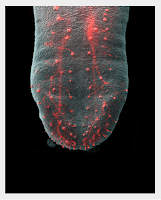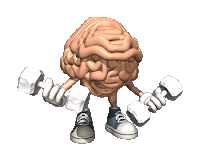The seminar, The Neuroplasticity Revolution: New Ways to Improve Learning, was hosted by Scientific Learning and featured self-described "psychiatrist, psychoanalyst, researcher, author, essayist and poet", Norman Doidge. Here's another individual I need to follow not only because Oliver Sacks is a fan, but because what Dr. Doidge taught today was so fascinating!
I'm sure each participant took something different out of the webinar, but here are the points that were important to me.
 *One way to change the brain is through the tongue! Dr. Doidge talked about Cheryl, a woman who had incredibly severe balance issues. Dr. Doidge explained, think about the movie Vertigo and that sense of forever falling. That's how Cheryl lived initially for many years. Neuroscientist, Dr. Paul Bach-y-Rita, demonstrated how the brain can heal itself or relearn what it once knew by electronically speaking to neurons and reactivating them. How did he do this? He placed a sensory device on the woman's tongue. Why the tongue of all places? Dr. Doidge explained that the tongue has so many sensory receptors. I did some more research on this and found that first the tongue has more sensory nerve endings than anywhere else in the body with the exception of the lips. We all know about taste buds, right? Well, what I discovered is that there are four nerves leading to the brain from the tongue that communicate with the brain, and the tongue is an obvious place for communicating with the brain because the nerve endings are so close to the surface of the brain. The result for Cheryl is that she can now live a normal life. She no longer has to fear falling, and she is no longer trying to catch herself from falling every second of her day.
*One way to change the brain is through the tongue! Dr. Doidge talked about Cheryl, a woman who had incredibly severe balance issues. Dr. Doidge explained, think about the movie Vertigo and that sense of forever falling. That's how Cheryl lived initially for many years. Neuroscientist, Dr. Paul Bach-y-Rita, demonstrated how the brain can heal itself or relearn what it once knew by electronically speaking to neurons and reactivating them. How did he do this? He placed a sensory device on the woman's tongue. Why the tongue of all places? Dr. Doidge explained that the tongue has so many sensory receptors. I did some more research on this and found that first the tongue has more sensory nerve endings than anywhere else in the body with the exception of the lips. We all know about taste buds, right? Well, what I discovered is that there are four nerves leading to the brain from the tongue that communicate with the brain, and the tongue is an obvious place for communicating with the brain because the nerve endings are so close to the surface of the brain. The result for Cheryl is that she can now live a normal life. She no longer has to fear falling, and she is no longer trying to catch herself from falling every second of her day. * Finally, why is early childhood considered the critical period for language learning? I've heard the term plasticity used with language learning - that the brain is most open to change, adaptation, learning at a young age and less plastic as an individual grows older. But, Dr. Doidge explained this even further. It's not that the brain is less able to learn as we age, but rather that an individual has used his native language so much that any new language has to compete with that amount of knowledge to gain any strength in the brain. Specifically, Dr. Doidge (as cited in Scientific Learning, 2013) said, "Every day we use our native language, we reinforce its dominance of the linguistic map space. It is because our brain is plastic - and competitive - that it is so hard to learn a new language and end the tyranny of the mother tongue."
* Finally, why is early childhood considered the critical period for language learning? I've heard the term plasticity used with language learning - that the brain is most open to change, adaptation, learning at a young age and less plastic as an individual grows older. But, Dr. Doidge explained this even further. It's not that the brain is less able to learn as we age, but rather that an individual has used his native language so much that any new language has to compete with that amount of knowledge to gain any strength in the brain. Specifically, Dr. Doidge (as cited in Scientific Learning, 2013) said, "Every day we use our native language, we reinforce its dominance of the linguistic map space. It is because our brain is plastic - and competitive - that it is so hard to learn a new language and end the tyranny of the mother tongue."
It's hard for me to imagine that there would be a battle in my brain for which language I should speak. But, it also begs the question - if immersion is the best way for a new language to gain ground in my brain, is it possible that language extinction could occur, or would the areas of the brain that control verbal abilities simply grow? I believe language extinction might only occur if a person is no longer permitted to use his native language. This makes me think of the original Native American language which has all but become extinct, or the children of Spanish-speakers who have immigrated to the US who came to the US with only so many years practice of their native language and through immersion, no longer remember their Spanish. So, it is possible, I think.
Scientific Learning. (2013, October 2). The neuroplasticity revolution: New ways to improve learning [webinar]. Retrieved from http://www.scilearn.com/events/webinars/. NOT AVAILABLE FOR REDISTRIBUTION
Scientific Learning. (2013, October 2). The neuroplasticity revolution: New ways to improve learning [webinar]. Retrieved from http://www.scilearn.com/events/webinars/. NOT AVAILABLE FOR REDISTRIBUTION







0 comments:
Post a Comment